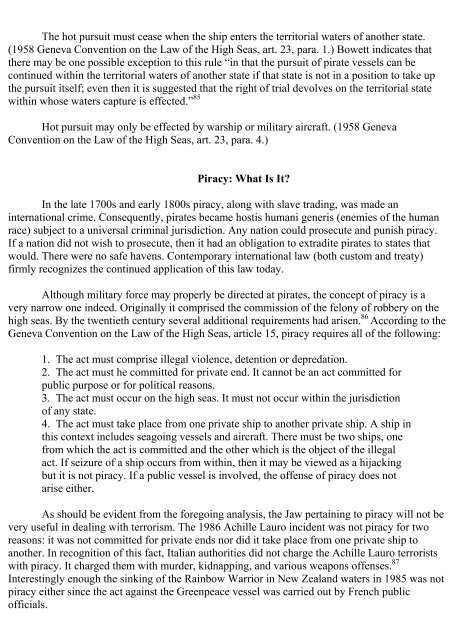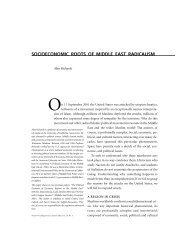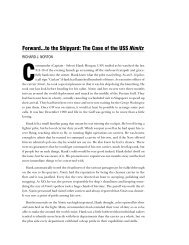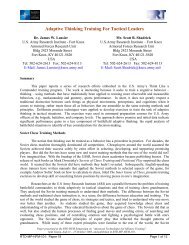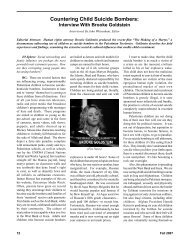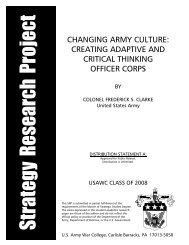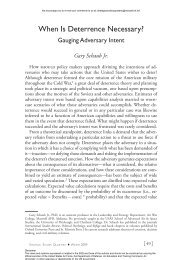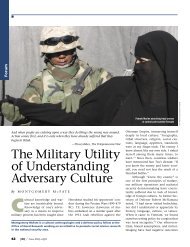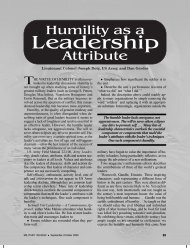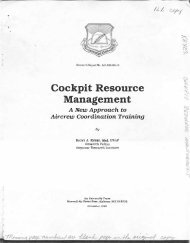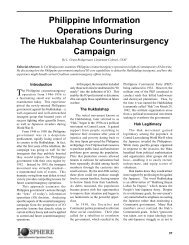Legitimate use of military force against state-sponsored - Air University
Legitimate use of military force against state-sponsored - Air University
Legitimate use of military force against state-sponsored - Air University
Create successful ePaper yourself
Turn your PDF publications into a flip-book with our unique Google optimized e-Paper software.
The hot pursuit must cease when the ship enters the territorial waters <strong>of</strong> another <strong>state</strong>.<br />
(1958 Geneva Convention on the Law <strong>of</strong> the High Seas, art. 23, para. 1.) Bowett indicates that<br />
there may be one possible exception to this rule “in that the pursuit <strong>of</strong> pirate vessels can be<br />
continued within the territorial waters <strong>of</strong> another <strong>state</strong> if that <strong>state</strong> is not in a position to take up<br />
the pursuit itself; even then it is suggested that the right <strong>of</strong> trial devolves on the territorial <strong>state</strong><br />
within whose waters capture is effected.” 85<br />
Hot pursuit may only be effected by warship or <strong>military</strong> aircraft. (1958 Geneva<br />
Convention on the Law <strong>of</strong> the High Seas, art. 23, para. 4.)<br />
Piracy: What Is It?<br />
In the late 1700s and early 1800s piracy, along with slave trading, was made an<br />
international crime. Consequently, pirates became hostis humani generis (enemies <strong>of</strong> the human<br />
race) subject to a universal criminal jurisdiction. Any nation could prosecute and punish piracy.<br />
If a nation did not wish to prosecute, then it had an obligation to extradite pirates to <strong>state</strong>s that<br />
would. There were no safe havens. Contemporary international law (both custom and treaty)<br />
firmly recognizes the continued application <strong>of</strong> this law today.<br />
Although <strong>military</strong> <strong>force</strong> may properly be directed at pirates, the concept <strong>of</strong> piracy is a<br />
very narrow one indeed. Originally it comprised the commission <strong>of</strong> the felony <strong>of</strong> robbery on the<br />
high seas. By the twentieth century several additional requirements had arisen. 86 According to the<br />
Geneva Convention on the Law <strong>of</strong> the High Seas, article 15, piracy requires all <strong>of</strong> the following:<br />
1. The act must comprise illegal violence, detention or depredation.<br />
2. The act must he committed for private end. It cannot be an act committed for<br />
public purpose or for political reasons.<br />
3. The act must occur on the high seas. It must not occur within the jurisdiction<br />
<strong>of</strong> any <strong>state</strong>.<br />
4. The act must take place from one private ship to another private ship. A ship in<br />
this context includes seagoing vessels and aircraft. There must be two ships, one<br />
from which the act is committed and the other which is the object <strong>of</strong> the illegal<br />
act. If seizure <strong>of</strong> a ship occurs from within, then it may be viewed as a hijacking<br />
but it is not piracy. If a public vessel is involved, the <strong>of</strong>fense <strong>of</strong> piracy does not<br />
arise either.<br />
As should be evident from the foregoing analysis, the Jaw pertaining to piracy will not be<br />
very <strong>use</strong>ful in dealing with terrorism. The 1986 Achille Lauro incident was not piracy for two<br />
reasons: it was not committed for private ends nor did it take place from one private ship to<br />
another. In recognition <strong>of</strong> this fact, Italian authorities did not charge the Achille Lauro terrorists<br />
with piracy. It charged them with murder, kidnapping, and various weapons <strong>of</strong>fenses. 87<br />
Interestingly enough the sinking <strong>of</strong> the Rainbow Warrior in New Zealand waters in 1985 was not<br />
piracy either since the act <strong>against</strong> the Greenpeace vessel was carried out by French public<br />
<strong>of</strong>ficials.


